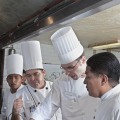Regarding financial ROI, three out of four people said cooking school was worth it and two of them graduated completely debt-free, as a result of scholarships and personal savings. Only one person felt that it wasn't. At the end of the day, if this decision is in front of you, follow your heart. As is customary with these questions, there is no single answer that works for everyone.
Cooking schools are extremely expensive, and if you can learn on the job, you'll save a lot of money. Learning on the job also gives a young chef a much better understanding of how to apply techniques in a kitchen's high-pressure setting. This will make them a better cook and, ultimately, a chef. In short, if you're starting out in the culinary arts because of glamour and fame, you might want to consider trying your luck as a pop star.
Being a chef is a difficult job and no one gives you a cooking program right out of cooking school. Having a realistic view of what you're getting into will greatly help future cookers. The job can be difficult, requiring long hours, repetitions, and working under tight time limits. Many of those who are dedicated to the culinary arts decide not to study and prefer to learn on the job.
That's okay, but if you really want to achieve the highest standards, studying for a culinary degree at a renowned culinary arts school is definitely something you should consider. The most obvious advantage in any debate about the value of culinary school is education itself. All of the various culinary school programs vary in length, class structure, and approach, but one can have a reasonable expectation of leaving culinary school with a basic knowledge of the terms used in cooking. And, if the school is good, graduates will also know how to execute the plates with those terms.
Some programs can also teach the story of Paul Bocuse, the basics of table service, and elementary school business classes. Schools with bachelor's degrees even have some liberal arts courses, such as writing and history. Perhaps most importantly, Daniel Boulud explains that students at culinary schools will learn skills in a very basic way, without any frills or shortcuts they can learn in a professional kitchen. The resounding agreement between those who have gone to cooking school and those who haven't is that, in either scenario, you get what you wear from it.
It's a risk either way. The school will speed up the learning process and increase your chances of getting a better paying job, but it will leave you tens of thousands of dollars in debt for a basic degree, not including interest. And the price of having that luxury is constantly rising. For those who want to make a future of the culinary arts, this profession requires that you have a high level of education.
While Beckert started with five apprentices in her class, there were only two left at the end of the three years. The dean of culinary arts at the Culinary Institute of America at Hyde Park, Brendan Walsh, says that since their first day of school, CIA students also taste, touch and feel ingredients, and develop their perceptions of condiments. Organization and cleanliness are paramount to a successful cook, which is why it is so important to start with good habits. Check your status with the state Department of Education, request to speak with former students, and attend classes to talk to current students.
This is especially true if you're pursuing a degree in culinary arts, which is a program that covers all the basics and more, while giving you a real idea of what life in a professional kitchen is really like through internships. The first two years of his career will be spent in a preliminary setting such as a dishwasher or preparatory cook. A culinary arts degree, even if you don't end up working in a traditional restaurant, could be a great option for you. For a profession with famously low starting salaries, it's hard to know if cooking school is worth it.
After the two-year bachelor's degree program, the student may choose to stay for a bachelor's degree that includes some liberal arts courses. Some graduates even establish long-term relationships with their instructing chefs and keep in touch personally throughout their careers for advice. The length of your culinary education depends entirely on what stage of your career you are at and which of the many culinary school programs you choose to study. Too many people don't know what they're getting into when they enroll in a culinary school, and Food Network thanks them in part.
. .


